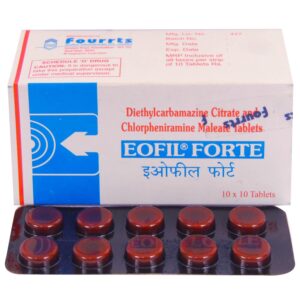CHLORPHENIRAMINE MALEATE + DIETHYL CARBAMAZINE
Chlorpheniramine Maleate: Chlorpheniramine maleate is an antihistamine medication used primarily for the relief of allergy symptoms. It works by blocking the action of histamine, a chemical that the body releases when it recognizes an allergen. By blocking histamine, Chlorpheniramine maleate helps to alleviate symptoms such as sneezing, runny nose, itching, and watery eyes.
This drug is commonly used to relieve symptoms of hay fever (allergic rhinitis), allergic conjunctivitis, and other allergic reactions. It can also be used to manage symptoms associated with the common cold, such as a runny nose and sneezing. Additionally, Chlorpheniramine maleate has sedative effects, making it effective for providing relief from allergy symptoms that may interfere with sleep.
The usual recommended dose of Chlorpheniramine maleate for adults is 4 mg to 8 mg every 4 to 6 hours, with a maximum daily dose of 24 mg. For children between 6 and 12 years old, the typical dose is 2 mg to 4 mg every 4 to 6 hours, with a maximum daily dose of 12 mg. It is important to follow the instructions given by a healthcare professional or the package label when taking this medication.
While Chlorpheniramine maleate is generally considered safe and well-tolerated, it can cause some common side effects. These may include drowsiness, dry mouth, blurred vision, constipation, and difficulty urinating. It is recommended to avoid driving or operating machinery if you experience drowsiness while taking this medication.
There are some precautions to keep in mind when using Chlorpheniramine maleate. It is important to inform your healthcare provider about any allergies or medical conditions you may have, especially glaucoma, asthma, high blood pressure, or an enlarged prostate. It’s also important to avoid taking other medications that may interact with Chlorpheniramine maleate without first consulting a healthcare professional.
Overall, Chlorpheniramine maleate is a widely used antihistamine that effectively provides relief from allergy symptoms. However, it is essential to follow the recommended dose and consult with a healthcare professional to ensure safe and proper usage of this medication.
Diethyl Carbamazine: Diethyl Carbamazine (DEC) is an antiparasitic medication primarily used to treat lymphatic filariasis, a disease caused by infection with thread-like worms called filariae. It is also used in the treatment of other parasitic infections, such as tropical eosinophilia and loiasis.
DEC works by killing the microfilariae (larval forms) of the filarial worms present in the blood and tissues. It does not directly kill the adult worms but renders them sterile, thus preventing further reproduction and slowing the progression of the disease.
The dose of DEC varies depending on the infection being treated. For lymphatic filariasis, the usual adult dose is 6 mg/kg of body weight once daily for 12-21 days. For other parasitic infections, the dosage may differ, and it is best to consult a healthcare professional for specific recommendations.
As with any medication, DEC may cause certain side effects. Some common side effects include dizziness, drowsiness, headache, nausea, vomiting, loss of appetite, and abdominal pain. These side effects are generally mild and go away on their own. In rare cases, more serious side effects like allergic reactions, liver problems, and neurological effects such as seizures may occur. It is important to promptly report any unusual or severe side effects to a healthcare provider.
Additionally, DEC should be used with caution in individuals with liver disease, seizure disorders, or a history of epilepsy, as it may exacerbate these conditions. It is not recommended for use in pregnant women or those breastfeeding, due to limited data on its safety in these populations.
It is crucial to follow the prescribed dosage and complete the full course of treatment to effectively eliminate the parasites. Healthcare professionals should be consulted for personalized advice and guidance regarding the use of Diethyl Carbamazine.

